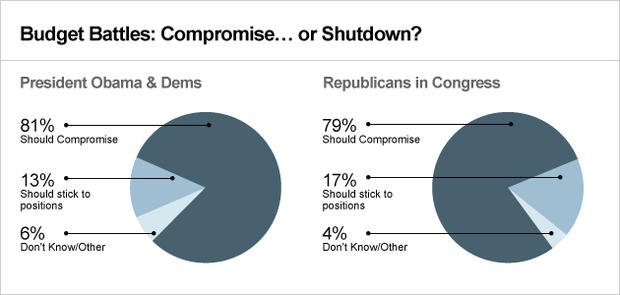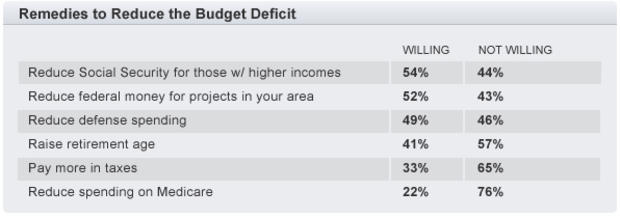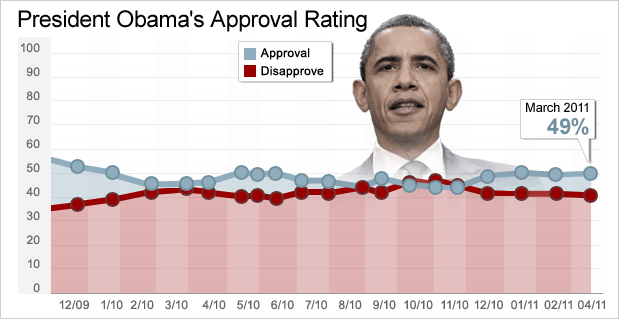Poll: Eight in 10 Americans want budget compromise
CBS News Poll analysis by the CBS News Polling Unit: Sarah Dutton, Jennifer De Pinto, Fred Backus and Anthony Salvanto.
As President Obama and Democrats in Congress prepare to square off at least one more time with Republicans over the federal budget, about eight in 10 Americans would like to see both sides strike a compromise rather than let the federal government shut down, according to the latest CBS News poll.
More than nine in 10 Americans call the federal budget deficit a serious problem, the poll shows - as many as seven in 10 call it very serious. However, just 7 percent named the deficit as the most important problem facing the country today. Most Americans, 51 percent, called the economy and jobs the most important problem, and most Americans agree Washington is not doing enough to create jobs.
Congress this year has focused largely on federal spending cuts, as the new GOP-led House struggles with the Democratic-led Senate to pass a budget for the rest of the 2011 fiscal year. President Obama last week signed into law a temporary spending measure that cut $6 billion from the budget while keeping the government operating for another three weeks.
Congress must pass another bill to avoid a government shutdown by April 8, and both Democratic and Republican leaders say this bill will be the last for the year. Some Tea Party-aligned members of Congress, however, have said they would prefer to let government operations come to a halt than approve spending they oppose, such as family planning funding.
Just a small minority of the public would prefer to see the lawmakers they support allow the government to shut down, according to the poll, conducted March 18 - 21.
Eighty-one percent of Americans say Mr. Obama and Democrats should compromise some of their positions in order to strike a budget deal, while just 13 percent said they should stick to their positions. Similarly, 79 percent said congressional Republicans should compromise, while 17 percent said they should stand their ground.
A majority (56 percent) of Tea Party supporters would also like the Republicans to compromise - though four in 10 Tea Party backers would prefer to shut the government down instead.
So far, both the president and Republicans are getting low marks for their handling of the deficit. Fifty-eight percent disapprove of how Mr. Obama is handling it, while 65 percent disapprove of how congressional Republicans are handling it.
Nearly 7 in 10 support air strikes in Libya
Support for new nuclear plants drops
While few Americans named the deficit when asked about the nation's most pressing problem, as many as 26 percent said cutting spending should be a priority over job creation, if given the choice. Sixty-three percent said creating jobs is more important than cutting spending. Democrats and independents are heavily in favor of job creation, while Republicans are more divided - 48 percent of Republicans said cutting spending should be more important, while 41 percent called creating jobs more important.
Just over half of Americans, 53 percent, think changes to Social Security and Medicare will be necessary in order to significantly reduce the budget deficit. As many as 62 percent of Republicans are likely to think changes will be needed.
However, many Americans are not willing to make cuts to these programs. As many as 57 percent are not willing to raise the age at which one can receive full Social Security benefits, and three in four do not want to see spending on Medicare reduced. There is more support for lowering Social Security benefits for retirees with higher incomes (54 percent), but 44 percent are not willing to do this.
When it comes to other possible deficit reduction remedies, 52 percent of Americans are willing to receive less federal funding for projects in their community, but they are divided on defense spending - 49 percent are willing to see that cut, but 46 percent are not.
Two in three Americans are unwilling to pay more in taxes in order to lower the budget deficit.
A struggling economy
A solid majority of Americans, 77 percent, still say the nation's economy is in bad shape. Americans offer more positive evaluations of their family's own financial situation, however, with 69 percent calling their own situation good. Forty-seven percent say the economy is getting better, while 26 percent say it's getting worse and 26 percent say it's getting better.
While the nation's unemployment rate dipped below 9 percent in February for the first time since April 2009, 58 percent of Americans remain at least somewhat concerned that they or someone else in their household will be out of work within the next 12 months.
In assigning blame for the state of the nation's economy, most Americans don't point the finger at either the current Congress or the Obama administration - instead many blame George W. Bush's administration (28 percent) and Wall Street (24 percent). Seven percent blame the Obama administration and 10 percent blame Congress.
Still, most say neither Mr. Obama nor congressional Republicans and Democrats are spending enough time tackling the nation's job and unemployment problems. Fifty-three percent say Mr. Obama is spending too little time on jobs; 68 percent say Republicans in Congress are giving the matter short shrift, and 68 percent say the same about the Democrats.
Mr. Obama's overall job approval rating is now 49 percent, while 41 percent disapprove. The percentage that approve is similar to what it was last month, and has hovered in the mid to high 40s for the past year. Mr. Obama gets his highest marks on his handling of two recent events that are happening overseas - military operations in Libya and disaster relief in Japan.
Overall, Congress' job approval stands at 21 percent, slightly lower than it was in February just after the new Congress was sworn in.
Obama's disaster management gets solid marks
Few Americans more fearful of nuclear power
Read the full CBS News poll
This poll was conducted by telephone on March 18-21, 2011 among 1,022 adults nationwide. Phone numbers were dialed from samples of both standard land-line and cell phones. The error due to sampling for results based on the entire sample could be plus or minus three percentage points. The error for subgroups is higher. This poll release conforms to the Standards of Disclosure of the National Council on Public Polls.



